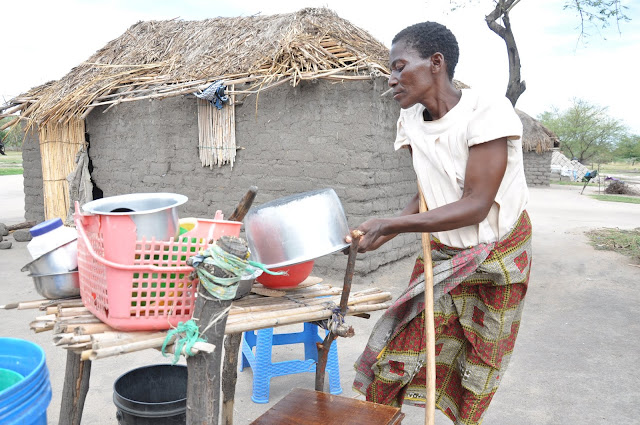Disabled woman and a resident of
Serengeti village-Bunda District, MwashiBedo setting up her domestic and other
appliances which were forcefully taken by Serengeti village executives—thanks
to Bunda paralegals who assisted to recover her properties.
By Correspondent, Bunda
MwashiBedo (50) is a
disabled woman who lives in Serengeti village, Bunda district. Like many other
people with disabilities in the country, Mwashi lives in severe poverty due to
the challenge of securing a steady income for individual upkeep and taking care
of the family. Luckily, Mwashi is blessed with a boy, Michael Mathayo aged 14
who at the tender age had to support her family through small money he gets
from petty businesses and farm works at the village.
As a strategy to speed up
implementation of development projects in the village, local authorities had
set up some rules and regulations, which among other things, require all
members to contribute—either labour power or cash money, for every development
project..
Two years ago, village
authorities set a development priority, construction of a secondary school,
asking every villager to contribute 10, 000/- for the project. The whole
village was made aware of the project through village-public meetings and other
platforms
Most of the villagers turned
up, contributed money as well as labour power to make sure the project is
completed on time, as effectively and efficiently as possible.
Due to abject poverty and
other factors associated with her disability, Mwashi did not manage to
contribute 10,000/= required by the village authorities
In what could be termed as
absolute disregard of disabled rights, local executives went to Mwashi’s home
and took all her properties—chairs, tables and other domestic appliances, which
they planned to sell in order to get the money as her contribution for the
construction of asecondary-school project.
She tried unsuccessfully to
claim back her properties, as both village chairman and ward executive officer
rejected her requests for “exemption” from the community development-fund
contribution.
Annoyed by local executives’
actions, some fellow villagers advised Mwashi to consult Bunda paralegal
organization, who assisted the disabled woman by taking her to Bunda district
social welfare and district commissioner offices for further support. The local
district commissioner and social welfare offices issued a letter directing
Serengeti village authorities to exempt Mwashi from community development fund
contributions. Paralegal took the letter to Serengeti village authorities, and
Mwashiwas immediately erased from the list of potential contributors to the
community developments project.
Serengeti village executives
also returned all Mwashi properties to her home. “I feel happy that paralegals
helped me to recover my properties and for ending the hussle I was going
through. Since then, no village leader has approached me for any development
contribution.” says Mwashi.
Having recovered her
properties, she is now proceeding with her normal life (of course with great
support from her boy) Michael, who works as casual labour in people’s farms and
engage in other economic activities--earning them income to support themselves.
“People with disabilities
and their families are confronted with numerous challenges on a daily basis.
Paralegals and other stakeholders should join hands and extend necessary
assistance to alleviate these obstacles, improve quality of life and empower
people with disabilities to fulfill their potential.”- commented one
independent social welfare expert, Anna Kitojo.













0 comments:
Post a Comment